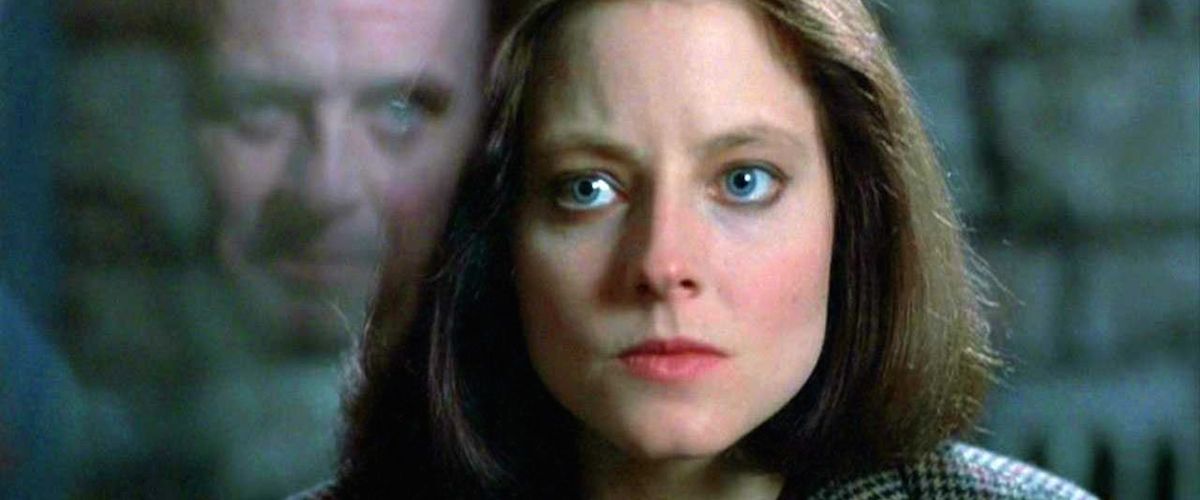It has been a good long while since I have felt the presence of Evil so manifestly demonstrated as in the first appearance of Anthony Hopkins in “The Silence of the Lambs.” He stands perfectly still in the middle of his cell floor, arms at his sides, and we sense instantly that he is not standing at attention, he is standing at rest – like a savage animal confident of the brutality coiled up inside him. His speaking voice has the precision of a man so arrogant he can barely be bothered to address the sloppy intelligence of the ordinary person. The effect of this scene is so powerful that it underlies all the rest of the movie, lending terror to scenes that do not even involve him.
Like all great entrances in the movies, his is carefully prepared. We learn that his character, Dr. Hannibal Lecter, is both a brilliant psychiatrist and a mass murderer, known as “Hannibal the Cannibal” because he eats his victims. He is already behind bars (and unbreakable Plexiglas) when the movie opens, and indeed “The Silence of the Lambs” is about the search for another mass murderer, named “Buffalo Bill,” who skins his victims.
Operating on the theory that it takes one to know one, the FBI agent in charge of the case (Scott Glenn) thinks Lecter might be able to provide useful clues in the search for Buffalo Bill. But Lecter toys with most of his inquisitors, or dismisses them, and so the agent hits on the idea of sending in an untried young female trainee (Jodie Foster). Perhaps she will appeal to the monster.
The notion of the beauty and the beast is of course central to horror stories, but, watching “The Silence of the Lambs” for the second time, I began to wonder if the author of the original novel, Thomas Harris, had started the project by jotting down a list of the great universal phobias and dreads. Here is a movie involving not only cannibalism and the skinning of people, but also kidnapping, being trapped in the bottom of a well, decomposing corpses, large insects, being lost in the dark, being tracked by someone you cannot see, not being able to get people to believe you, creatures who jump from the shadows, people who know your deepest secrets, doors that slam shut behind you, beheadings, bizarre sexual perversions, and being a short woman in an elevator full of tall men.
If the movie were not so well made, indeed, it would be ludicrous. Material like this invites filmmakers to take chances and punishes them mercilessly when they fail. That’s especially true when the movie is based on best-selling material a lot of people are familiar with. (“The Silence of the Lambs” was preceded by another Thomas Harris book about Hannibal Lecter, which was made into the film “Manhunter.”) The director, Jonathan Demme, is no doubt aware of the hazards but does not hesitate to take chances. His first scene with Hopkins could have gone over the top, and in the hands of a lesser actor almost certainly would have. But Hopkins is in the great British tradition of actors who internalize instead of overacting, and his Hannibal Lecter has certain endearing parallels with his famous London stage performance in “Pravda,” where he played a press baron not unlike Rupert Murdoch. There are moments when Hopkins, as Lecter, goes berserk, but Demme wisely lets a little of this go a long way, so that the lasting impression is of his evil intelligence.
Foster is inevitably upstaged by Hopkins’ rich and gruesome creation, but her steadiness and pluck are at the heart of the movie.
Some interesting aspects have been provided for her character: She is “one generation up from white trash,” as Lecter correctly guesses; she tries to disguise her hillbilly accent, and she has to muster up all of her courage to order a roomful of lascivious lawmen out of an autopsy room. The movie has an undercurrent of unwelcome male attention toward her character; rarely in a movie have I been made more aware of the subtle sexual pressures men put upon women with their eyes.
Against these qualities, the weak points of the movie are probably not very important, but there are some. The details of Foster’s final showdown with Buffalo Bill are scarcely believable.
Unless you look closely, you may miss the details of how Lecter deceives his pursuers in one grisly scene. The very last scene in the film is hard to follow.
But against these flaws are balanced true suspense, unblinking horror and an Anthony Hopkins performance that is likely to be referred to for many years when horror movies are discussed.



















